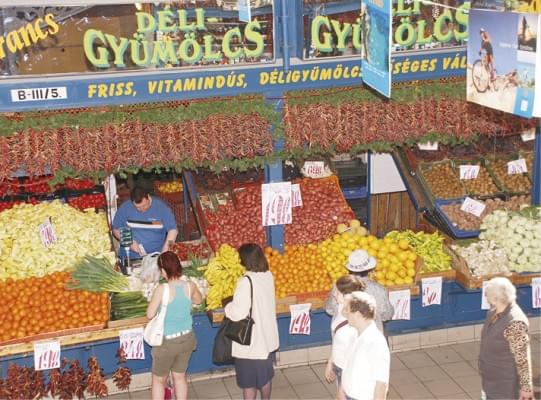The forgotten segment
The forgotten segment, or rather channel, is the world of traditional or farmers’ markets. I was invited by the Agricultural Research Institute (AKI) to discover this uncharted territory with the help of a study and now I would like to share my experiences with you, dear readers.
Dr Anikó Juhász and Dr Dorottya Szabó conducted a survey with 1,029 participants and published the results in a 200-page study. Let’s see the most important data from the study: KSH measured a HUF 130 billion turnover by marketplaces in 2011 – this practically means that marketplaces cover the ‘non-modern’ part of retail, pushing small independent shops to the sidelines. Taking a look at product categories we can see that the last measured vegetable sales data was 137,000 tons – reduced to half since the year 2000, only pepper sales improved. One of the reasons for this sales decrease is that people got used to buying fresh vegetables all year round in modern retail units, so they don’t have to buy a lot at the marketplace and store it at home. Fruits: apple and plum sales increased and the rest performed worse. My view is that apple was able to hold on because it is the most basic Hungarian fruit and it remained a quality- and ‘touch-sensitive’ product. Wine sales at the marketplace suffered the biggest decline in the last 10 years, sinking from 800,000 hectolitres per year to less than 300,000 hectolitres. Potato sales also reduced as in 2010 marketplaces sold 72,000 tons, only 60 percent of the volume sold in 2000. On the other hand 111 percent more milk (301 million litres) was purchased by market-goers than 10 years before. According to the study there are 664 marketplaces in Hungary, from which 33 are market halls. One of the document’s interesting conclusions is that milk, jams and preserved fruits can be the key products in drawing buyers to marketplaces. Another important finding is that personal buyer-seller relationships are also an influencing factor. Market-goers don’t expect to buy from farmers, what they focus on is the safe origin of the product. Just to illustrate that there is room for development in the domain of marketplaces: Dr István Fehér told during the discussion that followed the presentation of the study that there is a farmers’ market (shoppers actually have to go out to the farms!) in the United Kingdom, organised by three farmers only, where there are 100-150 buyers every day and the value of the average basket is GBP 20-25…
Related news
Related news
NKFH: inspections focus on discount prices and customer deception
🎧 Hallgasd a cikket: Lejátszás Szünet Folytatás Leállítás Nyelv: Auto…
Read more >





